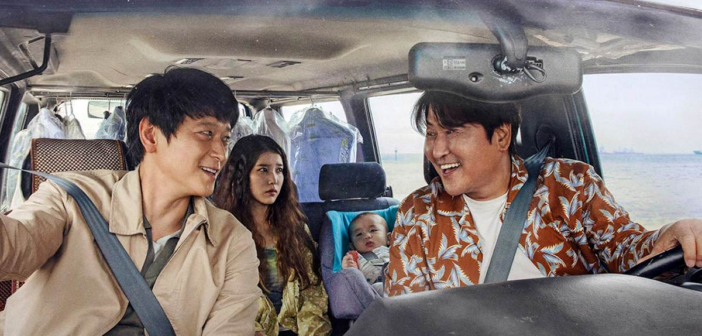'Broker' sets off as an intriguing, intimate family drama involving a Busan church and baby trafficking, but loses its intrigue in replacement for a tired cat-and-mouse chase across southern Korea.
-
6
Viewed on Thursday 26 May as press for the Cannes Film Festival 2022.
A Busan family church, a baby box, and a seamster . . . a massive grin spread across my face as all these components are immediately thrust into a human-trafficking web of lies. Hirokazu Kore-eda has again taken the director’s baton with latest drama, Broker (2022); a clever, heart-warming, and detailed look into unwanted pregnancies, and what it means to be an adoptive parent that doesn’t quite live up to the promise of its first act.
The film’s opening is a strong feat in storytelling, offering a promising peek into the happy-go-lucky road trip that’s in store for Sang-hyeon (Song Kang-ho), Dong-soo (Gang Dong-won), and So-young (IU). Jung Jae-il’s piano and orchestral score seems comfortably simple and familiar (previously composer for Okja (2017) and Parasite (2019)) and compliments the balance between farcical comedy and the [un]familiar domestic dynamics. Yet, whilst Hirokazu’s narrative was full to brim with character and farcical humour, the niche concept of the church’s oblivious involvement in baby trafficking seemingly felt under-used.
I admit that the far-fetched, unique plot is not the heart of the narrative. Hirokazu was shooting for a classic found family narrative, yet ultimately relied on beats that are a little too familiar. Broker is, essentially, a carbon copy of Rawson M. Thurber’s We’re the Millers (2013) that actually took itself seriously, flouting nuanced, complex characters. Bae Doona’s hard-nut Soo-jin yearns to be a mother, Dong-soo reels from his adoptive past and finds solace with So-young and Woo-sung.
However, with a lacklustre murder sub-plot being untimely introduced in the film’s second act, I can’t help but think we spend a little too much time with our inflated central cast as a whole. Each character feels like they get a limited—designated, perhaps—time to shine that felt far from organic. Needless to say, these moments are incredibly precious and poignant when taken with a pinch of salt. One scene on a Ferris wheel was a theatre favourite; one character’s eyes are concealed by a hand not their own, spelling hidden truths about the mechanics of shame, and how one is perceived by others. Character and audience are suspended high up, exposed . . . yet ironically isolated. Hirokazu certainly demonstrates that he’s still a master of emotion, giving his actors insanely rich characters to work from.
Thematically, Broker was convoluted. I enjoyed the high-stakes panic of the first act. I let the slow resolutions of the third wash over me. The film’s second act is where the plot loses direction, unsure of whether it wants to be a comedy or serious drama. I wanted Broker to take a further leap into the bonkers with his exceptional, star-studded cast. Instead, Hirozaku takes a leap into the familiar, leaving me feeling exhausted by the time the credits rolled.




